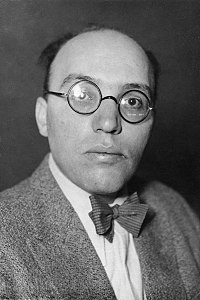Kurt Weill – Wikipédia, a enciclopédia livre
| Kurt Weill | |
|---|---|
| Nascimento | Kurt Julian Weill 2 de março de 1900 Dessau |
| Morte | 3 de abril de 1950 (50 anos) Nova Iorque |
| Residência | Kleinmachnow, Dessau |
| Sepultamento | Mount Repose Cemetery |
| Cidadania | Alemanha, Estados Unidos |
| Cônjuge | Lotte Lenya, Lotte Lenya |
| Alma mater |
|
| Ocupação | compositor, pedagogo, maestro, compositor de bandas sonoras |
| Prêmios |
|
| Obras destacadas | Die Dreigroschenoper, Rise and Fall of the City of Mahagonny, The Seven Deadly Sins, Street Scene, Der Silbersee |
| Instrumento | piano |
| Religião | Judaísmo |
| Causa da morte | enfarte agudo do miocárdio |
| Página oficial | |
| http://www.kwf.org/ | |
Kurt Weill (Dessau, 2 de março de 1900 - Nova Iorque, 3 de abril de 1950) foi um compositor alemão, autor de numerosas canções e da Ópera dos Três Vintens, transposição da Ópera dos Mendigos de Pepusch.
Vida[editar | editar código-fonte]
Kurt Julian Weill[1] nasceu numa família judaica muito religiosa (o seu pai era cantor numa sinagoga), e mostrou talento musical desde tenra idade. Estudou composição musical no Conservatório de Berlim com Ferruccio Busoni.
Colaborou com Bertolt Brecht em finais da década de 1920 na produção e criação de óperas e musicais, como Aufstieg und Fall der Stadt Mahagonny (Ascensão e Queda da Cidade de Mahagonny), Die Dreigroschenoper (A Ópera dos Três Vintens) e (Die sieben Todsünden) Os Sete Pecados Mortais.
Obras[editar | editar código-fonte]
Cantatas[editar | editar código-fonte]
- 1920: Sulamith
- 1927: Der neue Orpheus
- 1928: Das Berliner Requiem (texto de Bertolt Brecht)
- 1929: Der Lindberghflug (texto de Bertolt Brecht)
Música de Câmara[editar | editar código-fonte]
- 1918: String Quartet in B minor
- 1923: String Quartet op. 8
- 1919–1921: Sonata for Cello and Piano
Piano[editar | editar código-fonte]
- 1917: Intermezzo
- 1937: Albumblatt für Erika
Orquestral[editar | editar código-fonte]
- 1919: Suite for orchestra
- 1919: Die Weise von Liebe and Tod
- 1921: Symphony No.1 in one movement for orchestra
- 1922: Divertimento for orchestra, op.5
- 1922: Sinfonia Sacra, Fantasia, Passacaglia and Hymnus for orchestra, op. 6
- 1923: Quodlibet, suite for orchestra from the pantomime Zaubernacht, op. 9
- 1925: Concerto for violin and wind orchestra, op. 12
- 1927: Bastille Musik
- 1928: Kleine Dreigroschenmusik
- 1934: Suite panaméenne for chamber orchestra
- 1934: Symphony No. 2 in three movements for orchestra
- 1947: Hatikvah
Lieder, e chansons[editar | editar código-fonte]
- 1919: Die stille Stadt
- 1923: Frauentanz op.10
- 1923: Stundenbuch
- 1925: Klopslied
- 1927: Vom Tod im Wald (Death in the Forest), Op. 23, texto de Bertolt Brecht
- 1928: Berlin im Licht-Song
- 1928: Die Muschel von Margate: Petroleum Song
- 1928: Zu Potsdam unter den Eichen, texto de Bertolt Brecht
- 1928: Das Lied von den braunen Inseln, texto de Lion Feuchtwanger
- 1933: Der Abschiedsbrief, texto de Erich Kästner, interpretado por Marlene Dietrich
- 1933: La complainte de Fantômas, texto de Robert Desnos
- 1933: Es regnet, texto de Jean Cocteau
- 1934: Je ne t'aime pas, texto de Maurice Magre
- 1934: J'attends un navire, texto de Jacques Deval
- 1934: Youkali (originally the Tango habanera
- 1934: Complainte de la Seine, texto de Maurice Magre
- 1939: Stopping by Woods on a Snowy Evening
- 1942: Mine Eyes Have Seen the Glory
- 1942-44: Propaganda Songs
Bibliografia[editar | editar código-fonte]
- David Drew. Kurt Weill: A Handbook (Berkeley, Los Angeles, University of California Press, 1987). ISBN 0-520-05839-9.
- Kim H. Kowalke. A New Orpheus: Essays on Kurt Weill (New Haven, Yale University Press, 1986). ISBN 0-300-03514-4.
- Ronald Sanders. The Days Grow Short: The Life and Music of Kurt Weill (New York, Holt, Rinehart and Winston, 1980). ISBN 0-03-019411-3.
- Donald Spoto. Lenya A Life (Little, Brown and Company 1989)
- Lys Symonette & Kim H. Kowalke (ed. & trans.) Speak Low (When You Speak Love): The Letters of Kurt Weill and Lotte Lenya (University of California Press 1996)
- (em alemão) David Drew (Editor), Über Kurt Weill (Frankfurt am Main, Suhrkamp, 1975) Excellent collection of texts, including an introduction by David Drew and including texts by Theodor W. Adorno
- (em alemão) Jürgen Schebera, Kurt Weill (Rowohlt, Reinbek bei Hamburg, 2000)
Referências
- ↑ «Kurt Weill Dead; Composer, Was 50». The New York Times. The New York Times Co. 4 de abril de 1950. p. 28. Consultado em 1 de abril de 2008


 French
French Deutsch
Deutsch